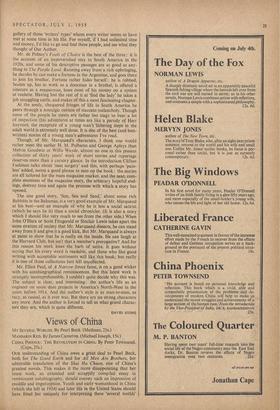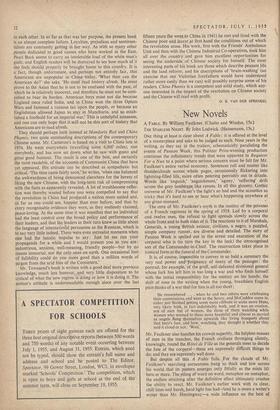Views of Chita
MY SEVERAL WORLDS. By Pearl Buck. (Methuen, 21s.) MANDARIN RED. By James Cameron. (Michael Joseph, 15s.) OUR understanding of China owes a great deal to Pearl Buck, both for The Good Earth and for All Men Are Brothers, her admirable translation of the Shui Hu Chuan, one of China's greatest novels. This makes it the more disappointing that her latest work, an extended and scrappily compiled essay in reminiscent autobiography, should convey such an impression of muddle and imperception. Youth and early womanhood in China (which she left in 1934) and later life in the United States should have fitted her uniquely for interpreting these 'several worlds'
to each other. In so far as that was her purpose, the present book is an almost complete failure. Loyalties, prejudices and sentimen- talism are constantly getting in her way. As with so many other people dedicated to good causes who have worked in the East, Pearl Buck seems to carry an intolerable load of the white man's guilt; and English readers will be dismayed to see how much of it she feels should properly be brought home to this country. It is a fact, though unfortunate, and perhaps not entirely fair, that Americans are unpopular in China today. 'What then can the American do?' she asks. 'He must read history afresh. He must prove to the Asian that he is not to be confused with the past, of which he is relatively innocent, and therefore he must not be com- pelled to bear its burden. American boys must not die because England once ruled India, and in China won the three Opium Wars and fastened a ruinous tax upon the people, or because an Englishman allowed Japan to stay in Manchuria, and so estab- lished a foothold for an imperial war.' This is unhelpful nonsense, and one can only hope that it will not be this sort of history that Americans are to read afresh.
They should perhaps look instead at Mandarin Red and China Phcenix, two quite outstanding descriptions of the contemporary Chinese scene. Mr. Cameron's is based on a visit to China late in 1954. He went everywhere (travelling some 6,000 miles), met everybody, and has now set down what he saw with gusto and great good humour. The result is one of the best, and certainly the most readable, of the accounts of Communist China that have yet appeared. His attitude can be described as sympathetic but critical. 'The time came fairly soon,' he writes, 'when one balanced the awkwardness of being denounced elsewhere for the heresy of liking the new Chinese, with the long-term risk of compromising with the facts as apparently revealed. A lot of troublesome reflec- tion was thereby wasted before you were compelled to say that the revolution in China had produced a nation more united and, as far as one could see, happier than ever before, and that by every recognisable evidence they were, as they endlessly claimed, peace-loving. At the same time it was manifest that no individual had the least control over the broad policy and performance of their leaders, and that the leaders in their turn knew as little about the language of international persuasion as the Russians, which is to say very little indeed. There were even surrealist moments when one had the lunatic impulse to say : Just let me run your propaganda for a while and I would present you as you are: industrious, anxious, well-meaning, friendly people—but by no means immortal, nor the only ones on earth. One occasional hint of fallibility could do you more good than a million words of jargon from the arid files of the Comintern.'
Mr. Townsend's book is written with a good deal more previous knowledge, much less humour, and very little disposition to be critical of what the new regime is doing or how it is doing it. The author's attitude is understandable enough since over the last fifteen years (he went to China in 1941) he met and lived with the Chinese poor and learnt at first hand the conditions out of which the revolution arose. His work, first with the Friends' Ambulance Unit and then with the Chinese Industrial Co-operatives, took him all over the country and gave him excellent opportunities for seeing the underside of Chinese society for himself. The most interesting parts of his book are those which describe peasant life and the land reform; and his descriptions of 'brain-washing' (an exercise that our Victorian forefathers would have understood rather more easily than we can) will possibly surprise some of his readers. China Plurnix is a competent and solid study, which any- one interested in the impact of the revolution on Chinese society and the Chinese will read with profit.
0. B. VAN DER SPRENKEL















































 Previous page
Previous page